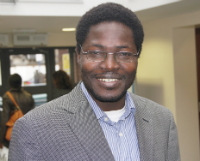Listen actively, speak graciously
Reflections on a recent church process to discuss differing views to same-sex relationships. By Seun Kolade

I remember reading James Sire’s book, The Universe Next Door, about 22 years ago in the university. The words in the inside page have stuck with me ever since: “for any of us to be fully conscious intellectually, we should not only be able to detect the worldviews of others but be aware of our own - why it is ours and why in the light of so many options we think it is true”.
Sire’s counsel is even more pertinent in what today has often been described as a plural, post post-modern world. If we are to communicate effectively as Christians and fruitfully bear witness to the Gospel, we need to engage the world with a mind that is at once disciplined and open, with a heart that is both sanctified with truth and rich in mercy, with our arms stretched out in love, and our garments unstained.
This is the starting point of my reflection on a recent process in my church in which the entire church was grappling with issues around same sex relationships. Apparently, it had been a long-standing issue that has threatened to tear the life of the church apart. In a previous process, the fellowship had, after a lengthy period of arguments and counter arguments, came to a decision to, in effect, “agree to disagree”. A few years down the line, the matter had to be revisited as a majority of the members found that the “agree to disagree” position was not satisfactory. I was part of the consultative group that was set up for this purpose.
The group was set up to reflect the whole spectrum of church memberships in its diversity relating to ethnicity, age groups and strength of views on the subject matter. My aim here is not to discuss at length the various points and counterpoints, and what decisions were made at the end of it. Instead, I think the process itself was the most significant take away from the exercise, and it is one I hope others will find helpful.
A listening exercise
 The group decided from the beginning, that if the exercise was to be fruitful, we must all undertake to “listen actively, and speak graciously” to one another. This resolution was critical for the broadly positive and warm atmosphere maintained in the weeks that followed, and in the wake of what were often difficult exchanges with strongly held views and deep-seated emotions on both sides of the exchange.
The group decided from the beginning, that if the exercise was to be fruitful, we must all undertake to “listen actively, and speak graciously” to one another. This resolution was critical for the broadly positive and warm atmosphere maintained in the weeks that followed, and in the wake of what were often difficult exchanges with strongly held views and deep-seated emotions on both sides of the exchange.
In the end, our ‘listen actively, speak graciously’ resolution (it was more than a slogan) was underpinned by a realisation of an important Christian truth: that while precepts are important, right precepts matter only to the extent that they bring about and affirm right relationships: human to human, and human to God. We recognise that a right relationship is one that affirms the dignity of, and love for, all peoples, irrespective of their backgrounds, views, or status. Dignity and love for people are not rewards for agreeable viewpoints. They are God given, inherent in God’s creative act, amplified in God’s redemptive intervention. The price, and there is none bigger, for the dignity of all humans is the Cross of Christ.
We also realise, right from the off, that to listen actively goes well beyond hearing what people are saying. It sounds a bit cliché, but it is very important, otherwise what we would have will in effect be a dialogue of the deaf. Beyond engaging with the sounds of peoples’ voices, we needed to be willing to make a conscious journey into their world, to know, to understand, to engage not only at the intellectual level but also at the emotional level. At a practical and personal level, this entailed embracing our own vulnerabilities, recognising that to gain new knowledge and understanding is to let go of some long-held assumptions.
Searching for knowledge
So we reached wide and dug deep in the search for knowledge on this issue. In one of the first meetings we came up with a list of recommended texts reflecting the two sides of the debate on same sex relationships. These were books offering theological expositions, pastoral insights and personal reflections. This was a hugely important part of the whole process. As we read and discussed the books, there were more than a few surprises: members realising how unfounded, and sometimes untenable, some of their long-held assumptions were. In the end every single member of the group moved from original entrenched views - for the majority, not so much in terms of what they believed but what they understood. More importantly, how they should engage with those who hold different views.
It became increasingly clear to us that much of the anger and divisive language that pervaded previous discussions on the issue were rooted in inadequate knowledge, and the insecurities often associated with limited knowledge of the issues. Even when we ultimately disagree with people, a deeper knowledge of our own position, and an understanding of the other’s views, can only make for more positive relationship and fruitful communication with those who do not share our views.
How should we then witness?
This takes me back to the James Sire’s words quoted at the beginning of this piece. If we are to be effective and fruitful in our witness in the 21st century as Christians, we need to forgo the self-cossetting, insular approach that tends to, unwittingly, shut us out of the world. We need to first engage more vigorously and rigorously with scripture in the light of the Spirit.
This is an exercise that is both devotional and intellectual, both mutually reinforcing. Armed with this confidence, we need to go out and engage more openly with the world out there. We need to know the universes next door in order to more fruitfully proclaim the message of him who holds the universe together by the word of his power.
 Seun Kolade is in the leadership of Tabernacle Baptist Church, Wolverhampton, where he is involved in a number of service and outreach activities. He is also a university academic with research interests in transformative entrepreneuring, spiritual capital and post-disaster preparedness and response.
Seun Kolade is in the leadership of Tabernacle Baptist Church, Wolverhampton, where he is involved in a number of service and outreach activities. He is also a university academic with research interests in transformative entrepreneuring, spiritual capital and post-disaster preparedness and response.
This piece appears in the Spring 2020 edition of Baptists Together magazine
Images
Tree illustration | wildpixel | istockphoto.com
Hands | fizkes | Shutterstock.com
Baptist Times, 10/03/2020